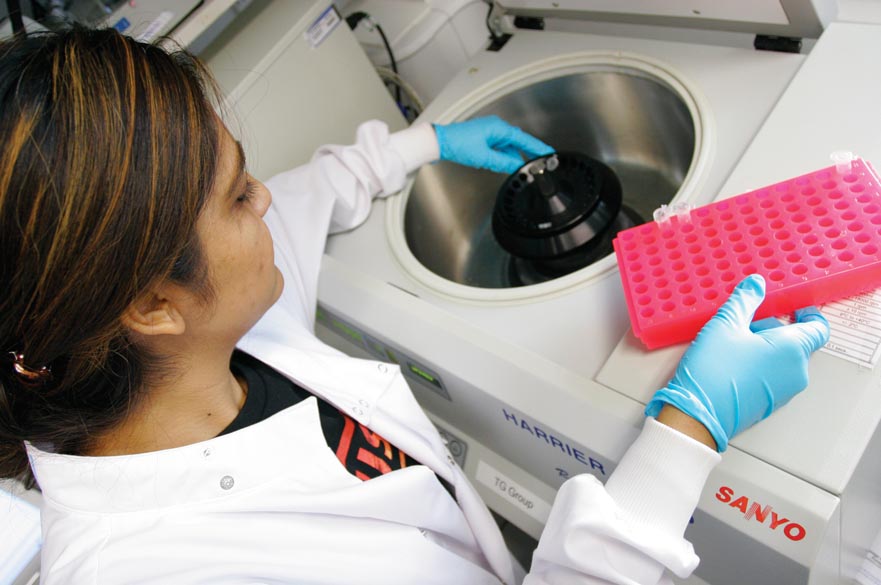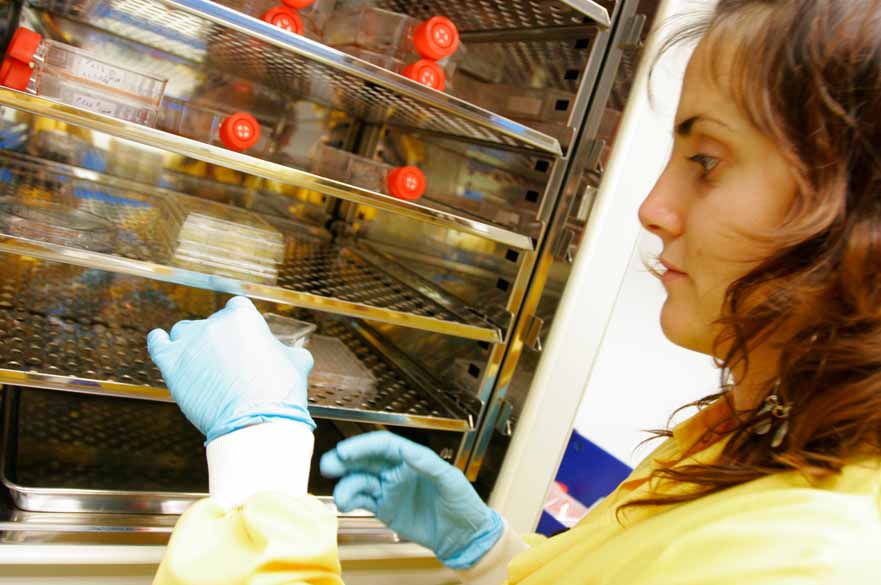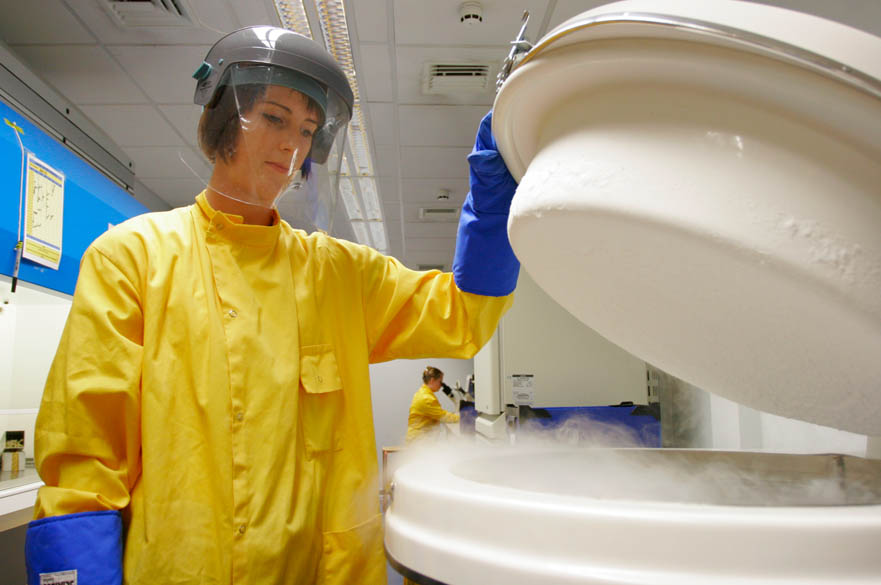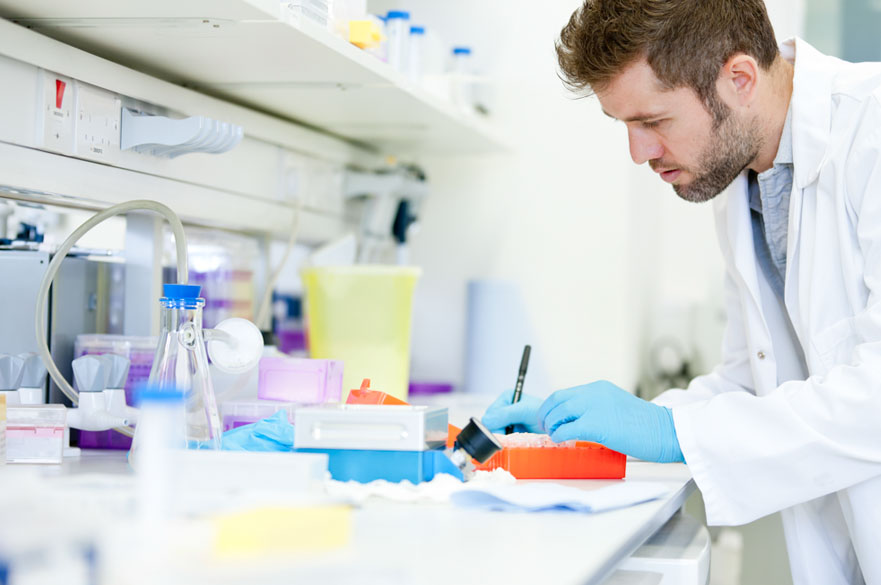Molecular Microbiology MRes
About this course
This Molecular Microbiology Masters course is particularly relevant if you:
- are a recently qualified undergraduate and are looking for the professional skills needed to obtain a job in a bioscience company
- are working in an organisation and want a Masters-level qualification to give you a competitive edge
- require the skills and experience needed to study for a research degree
- are an international student who would like to study abroad
- would like the chance for extended research work in the lab of an experienced research academic
- want to use cutting-edge facilities to develop your own learning and research.
What you’ll study
The MRes courses are divided into taught elements (60 credit points) and a laboratory-based research project (120 credit points). You will complete the extended research project in one of our highly rated research teams.
Core modules:
Research Methods and Bioethics (20 cp)
This module encourages you to think beyond your own subject, and interact accordingly. You'll gain a solid foundation in literature review, research design and planning, data analysis and a poster presentation by focusing your studies on a related ethical issue. Ethical issues in research will also be explored, as you discover when and how to obtain ethical clearance in accordance with ethical governance at NTU.
MRes Research Project (120 cp)
In consultation with a supervisor at NTU, you'll select a research topic comprising an original, defined research question (or series of such questions), and develop a written research proposal for the Project. You'll then present this proposal as part of the Research Methods and Bioethics module.
Working individually with the guidance of supervisors, you'll design your experiments and computer-based approaches to address the research questions. A diary-style record of protocols or methods will be used to generate entries for your skills portfolio.
You'll communicate your findings through a written thesis, and a poster presentation. For the MRes course, an interim written report and oral presentation will be assessed after six to eight months of work, in order to review your progress.
Molecular Microbiology (20 cp)
This module provides you with a strong grounding in microbial structure, physiology and behaviour at the molecular level. The module content draws on recent research findings, to provide our students with awareness of the current trends in the field.
By working through case studies, you’ll uncover the essentials of microbial genetics and molecular biology, including microbial structures and physiology; cell-cell communication; global regulatory circuits, and host –pathogen interaction.
Optional modules:
Choose from one of the following modules:
Microbial Diagnostics (20 cp)
This module aims to provide you with an understanding of the rationale and process of designing modern microbial diagnostic assays. Furthermore, you'll explore the theory and rationale of techniques such as culture-based diagnosis, serology, PCR, real-time PCR, microarrays, and sequencing for infectious disease diagnostics. You'll gain practical experience of performing real-time PCR detection from a sample.
Medical Microbiology (20 cp)*
Interactive and interesting eLearning material will be the basis for the module. You’ll develop an appreciation of the importance of medical microbiology in the diagnosis, prevention and treatment of disease, and gain a high-level of understanding of the subject.
* Mixture of eLearning and guided tutorials / workshops
We regularly review and update our course content based on student and employer feedback, ensuring that all of our courses remain current and relevant. This may result in changes to module content or module availability in future years.
How you're taught
Taught modules are assessed by a variety of different types of course work including:
- written assignments
- oral presentations
- poster presentations
- examinations
- a research project - it will involve the design, implementation and reporting of a major research task as a thesis and presentation orally and / or as a poster.
This Molecular Microbiology postgraduate degree will be delivered through lectures, laboratory classes, demonstrations, computer packages, and project work. We have state-of-the-art lecture, computing, library and laboratory facilities at your disposal.
Learn a new language
Alongside your study you also have the opportunity to learn a new language. The University Language Programme (ULP) is available to all students and gives you the option of learning a totally new language or improving the skills you already have. Find out more about the ULP.
Where you'll study
Based at the Clifton Campus, Biosciences students are primarily based in the Eramus Darwin and Rosalind Franklin buildings, which houses some of the UK's best interactive teaching laboratories to support research activities in:
- immunology
- cell-based therapy
- bio-materials science
- neuroscience
- pharmacology
- toxicology
More about our world-class facilities can be found here.
Research informed teaching
By daring to think differently our research is tackling real-world issues. The subjects you will study with us are informed by our research so you can be sure your knowledge will be cutting-edge in your field. In the last Research Excellence Framework (REF 2021) - the UK's system for assessing the quality and impact of research in universities - we’re proud that 99% of NTU’s Allied Health Professions, Dentistry, Nursing and Pharmacy submission was assessed to be world-leading or internationally excellent.
How you're assessed
Coursework (100%)
Contact hours
Lectures / seminars / workshops (20%) and independent study (80%)
Careers and employability
The vast majority of students from this Molecular Microbiology postgraduate degree progress onto relevant employment within their chosen field or study for a PhD. This is because they are able to develop extensive knowledge of their subject area as well as vital research skills. This knowledge is further enhanced by the research project which students can develop in their area of interest.
Skills portfolio
You will gather together relevant practical skills throughout laboratory classes producing a training record. This can be presented to potential employers as proof of competence in a laboratory setting. It also provides you with experience of managing what is essentially a personal development portfolio, which is now a standard tool for monitoring progression and performance in a scientific career as well as out in the sector.
Employability Team
The University's award-winning Employability Team has an enviable reputation for helping our graduates find employment and offers individual consultations. Sessions are available to all students at NTU on CV writing and interview technique. Visit our Employability pages to find out more about the services they offer.
Although this course does not offer a formal placement, it is vocationally focused and benefits from strong links with industry.
Placements
NTU is one of the most employment-focused universities. Increasingly, employers want to recruit graduates who have real-world work experience. That’s why all of our courses, across every subject area, offer you a work experience opportunity. Our experts help build and support your future with a range of career programmes and events.
The school of Science and Technology will work closely with you to help find a placement and strengthen your CV and interview techniques. You'll be supported and assessed throughout your placement year and will write a reflective report and diary at the end of your placement. When you successfully complete your placement and submit your placement report, you will be eligible to receive an additional award of a Postgraduate Diploma in Professional Practice.
Please note that placements are not guaranteed and the process is competitive through an application and interview process.
If you take the sandwich route, and start this course in September / October you will complete your placement following your taught modules and research project.
Our recent students have taken placements across a wide range of companies including the NHS, The Frozen Ark Project and Public Health England. They secured varied roles such as Biobank Intern, Lab Technician and Volunteer Mentor.
Re:search Re:imagined
To us, research is about more than writing papers and proposing new ideas. By daring to think differently, we’re disrupting the research landscape and finding the answers to the questions that really matter. From conservation management to sustainable farming, we’re inspiring the brightest minds to rise up and find solutions to some of the most significant global challenges facing society.
NTU Enterprise
You'll also have the opportunity to turn your ideas into a viable business with help from NTU Enterprise, NTU's purpose-built Centre for Entrepreneurship and Enterprise, a support centre to help students create, develop and grow their own businesses.
Campus and facilities
You’ll mainly be studying in the Interdisciplinary Science and Technology Centre (ISTeC) and Rosalind Franklin Buildings with access to facilities including our extensive SuperLab, with space for almost 200 students.
Our self-contained, community-focused Clifton Campus has been designed to keep students busy between lectures. Catch-up with your coursemates in the Pavilion’s barista café and Refectory; brainstorm group presentations in chic and stylish study spaces; enjoy some proper R&R in The Point, home of our Students’ Union. The campus also hosts the multimillion-pound Clifton Sports Hub, offering great options for everyone — whatever your interests, and however competitive you’d like to get!
You’re also right next to the bright lights of Nottingham — one of Britain’s top 10 student cities, and one of Europe’s top 25. All through termtime, a dedicated on-campus bus service will get you to the heart of the action (and back) in under 25 minutes. You’ll find a city stuffed with history, culture, and well-kept secrets to discover at your leisure: enjoy lush green spaces, galleries, hidden cinemas and vintage shopping by day, and an acclaimed food, drink and social scene by night.
Entry requirements
UK students
Academic entry requirements: 2.1 honours degree or higher qualification in a biological subject, plus laboratory experience gained through employment or an undergraduate research project.
Applicants with relevant employment experience or other relevant qualifications will also be considered.
Additional requirements for UK students
There are no additional requirements for this course.
Other qualifications and experience
We welcome applications from students with non-standard qualifications and learning backgrounds and work experience. We consider credit transfer, vocational and professional qualifications, and any work or life experience you may have.
You can view our Recognition of Prior Learning and Credit Transfer Policy which outlines the process and options available, such as recognising experiential learning and credit transfer.
Getting in touch
If you need more help or information, get in touch through our enquiry form.
International students
Academic entry requirements: 2.1 honours degree or higher qualification in a biological subject, plus laboratory experience gained through employment or an undergraduate research project.
Applicants with relevant employment experience or other relevant qualifications will also be considered.
We accept equivalent qualifications from all over the world. Please check your international qualifications on our international entry requirements page.
English language requirements: See our English language requirements page for requirements for your subject and information on alternative tests and Pre-sessional English
Additional requirements for international students
Student visas
Following an update to the immigration rules in January 2024, if you intend to study in the UK on a Student visa, you can only bring your partner / children (‘dependants’) if you are studying one of the following:
- a PhD or other doctorate (RQF8)
- a research-based higher degree.
Please note that all of our MRes courses are classed as ‘postgraduate taught’ and therefore do not meet the requirement for you to be accompanied to the UK by your dependants.
English language requirements
View our English language requirements for all courses, including alternative English language tests and country qualifications accepted by the University.
If you need help achieving the language requirements, we offer a Pre-Sessional English for Academic Purposes course on our City campus which is an intensive preparation course for academic study at NTU.
Other qualifications and experience
We welcome applications from students with non-standard qualifications and learning backgrounds and work experience. We consider credit transfer, vocational and professional qualifications, and any work or life experience you may have.
You can view our Recognition of Prior Learning and Credit Transfer Policy which outlines the process and options available, such as recognising experiential learning and credit transfer.
Sign up for emails
Sign up to receive regular emails from the International Office. You'll hear about our news, scholarships and any upcoming events in your country with our expert regional teams.
Getting in touch
If you need advice about studying at NTU as an international student or how to apply, our international webpages are a great place to start. If you have any questions about your study options, your international qualifications, experience, grades or other results, please get in touch through our enquiry form. Our international teams are highly experienced in answering queries from students all over the world.
Policies
We strive to make our admissions procedures as fair and clear as possible. To find out more about how we make offers, visit our admissions policies page.












